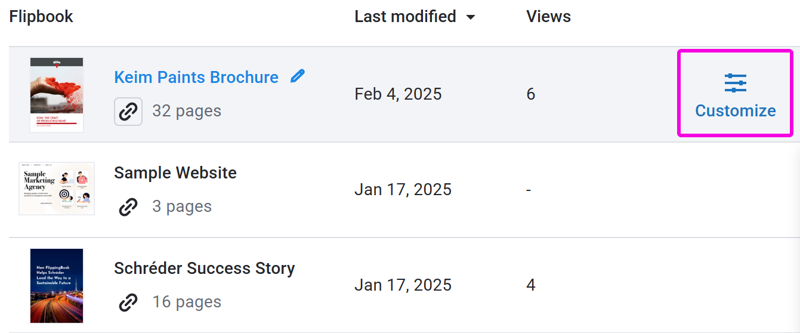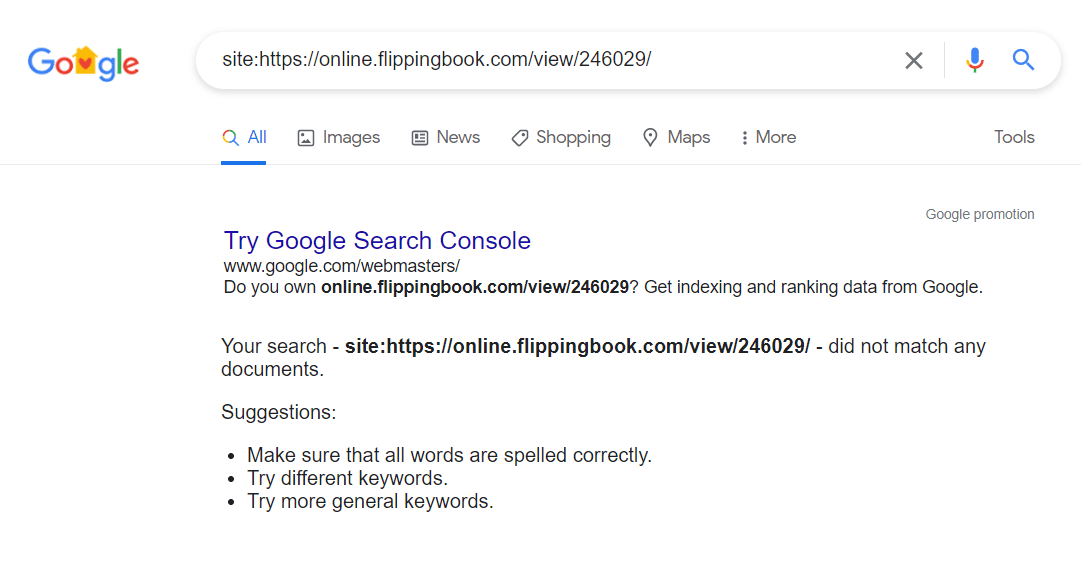How do search engines work with my flipbooks?
Your FlippingBook Online flipbooks are not indexed by search engines by default. But you can make them searchable on Google and other search engines with a few clicks. We have optimized your flipbooks for SEO so they are fully indexed by Google, Yahoo!, Bing, and other search engines. Your audience will be able to find your flipbooks by simply entering the keywords and phrases contained in your publications in their favorite search engine..png)
Among 25 million matching results, this flipbook made second place even when searching for very generic terms!
This article has answers to the most common questions our users ask about our SEO (Search Engine Optimization):
- How can I enable search engine indexation for a flipbook?
- Should I enable SEO indexing?
- Can I disable SEO-indexing later?
- How will my flipbook show up on Google?
- How can I get a higher position in Google’s results?
- How long does it take for Google to find will my flipbook?
- How does the indexing work when I embed my flipbook into my own site?
- Can I add custom meta-tags to my flipbooks?
How can I enable search engine indexation?
Note
It is not possible to enable search engine indexation during the trial of FlippingBook Online.
To make your flipbook indexed by search engines, follow the steps below:
- Open the list of your flipbooks.
- Hover over the flipbook you'd like to change and click Customize

- Go to the Privacy section and click on it to expand it.
- Select the option Public.

- Click Finish before leaving the Customize menu.
Should I enable SEO-indexing?
That is up to you to decide. If you don’t want your content to be found on search engines, then don’t enable it. For example, if your flipbook is only intended for a specific audience - if you want a flipbook to be available only to people who have the link, then don’t enable SEO indexing.
In all other situations, we recommend that you enable it so people who are unfamiliar with your content can easily find it. But it will also help people who have read your flipbooks before! Remember that when your readers are looking for your content, many of them will not go to your site, or try to find the email with the link that you sent them. They turn to Google instead, expecting it to find everything.
Can I disable SEO-indexing later?
Yes, it is possible to disable SEO indexing. Note that this does not immediately remove your flipbook from Google’s results! Even Google doesn’t look at every page on the web every day. This means that it may take a few days or even weeks before your flipbook will stop showing up in Google’s results.
How will my flipbook show up on Google?
When people find your flipbook on Google they will see something like this:
The search results consist of 3 elements:
- The link. By default, your link looks like this: https://online.flippingbook.com/view/123456789. If you have FlippingBook Online Advanced or higher, then you can set up a custom domain to change the online.flipppingbook.com part to your own site.
- The title of your flipbook.
- a snippet of the relevant text in your publication. Other search engines sometimes show the description in the results.
The title will always appear in the search results. So make sure that it looks good and is relevant. This will reinforce your readers that they are on the right way to the content they are looking for.
Learn how to Customize the title and description of your flipbook.
How can I get a higher position in Google’s results?
Search engines look at tons of different factors when determining which result to show first. Many of them are technical. We take care of all those. But there are also things that are outside of our control. Here’s what you can do yourself:
- Just make great content!
Google doesn't fall for simple soundbites. Nor does it just look if the search term is present on your page. It also looks at the surrounding content. It values in-depth content that covers a broad spectrum of its respective subject. If your content provides real value to the user, it will rank higher. - Get other sites to link to your flipbook
This may be somewhat out of your control but the number of other sites to link to your site is one of the most important factors. This will increase your relevance in search engines (and get more visitors too!). At the very least, make a link from your own site to your flipbook! - Pay attention to the title and description of your flipbook
We often see flipbooks that still have the filename of the PDF as their title. Something like Metal_review_final10.indd. Not only does this looks bad when your visitors open the flipbook, it also spoils your ranking in Google!
- If a search term appears in the title of the HTML page (for which we use the title) then Google itself will also rank it higher.
- Search engines are self-learning: Suppose that you have created a flipbook about trends in metallurgy. Now John Doe searches for ‘trends metallurgy 2021’. Google shows the link to your flipbook in the results. If John clicks on your link, then that tells Google that your flipbook is relevant. A higher ‘click-through rate’ means a higher ranking.
But how does John determine on which link to click? He only sees the link, title, and a short snippet of text to base his decision upon. So if John sees ‘Metal_review_final10.indd’ instead of ‘Trends and developments in Metallurgy’ he is much less likely to click on it!
- Set up a custom domain
Custom domains are available on the Advanced plan or higher. If you set them up correctly, they can also boost SEO. The effects are similar to the flipbook title: if people see a link to your own site instead of online.flippingbook.com, they are more likely to click on it. And if the search term is part of the (sub)domain, that makes your flipbook rank higher. But make sure to add such flipbooks to your site's sitemap! Since these flipbooks are no longer on the flippingbook.com domain, we don't add them to our own sitemap anymore. - Update your content regularly.
No need to do that weekly, but Google prefers fresh content over stale. So make sure to revise your content every six months or so.
NoteMake sure that your flipbooks use real text. We sometimes see that our clients upload PDFs that consist of just images, and even the text is part of the image. If there is no real text (i.e. text that you can select and copy/paste), then there is nothing to index!
How long does it take for Google to find my flipbook?
It’s hard to predict when new content is indexed exactly. Even Google doesn't re-index every page every day. Our own experience shows that our flipbooks are fully indexed after about a week. This is no guarantee, and conventional internet wisdom says that it can take between 1 to 4 weeks.
To see if your flipbook has already been indexed by Google, you can open Google and then search for site: followed by the link to your flipbook. If it has already been indexed, you will see some results here. If not, then you will get no hits, like in the screenshot below.

How does the indexing work when I embed my flipbook into my own site?
Search engines index both your webpage where you embed your flipbook into and the flipbook itself. But they are still separate pages. So if someone searches for keywords that appear both on your webpage and in the publication that you embedded into that page, then both are found:
In the example above, you see a lovely embedded catalog. When searching for Bandshoppe catalog, we find both the page on their site, and the direct link to the flipbook. If we click on the top link in the results, Bandshoppe's site is opened, with the embedded flipbook. If we would click on the second link, the flipbook would be opened directly.
If you would search for keywords that are present in your flipbook, but not on your page itself in, then only the flipbook would appear in the search results.
Can I add custom meta-tags to my flipbooks?
No, you can’t add custom meta tags. We generate all the important meta tags automatically, based on the flipbook title and description. So make sure these contain relevant information!
Sometimes we get the question if it is possible to add keyword tags to the pages. Since most search engines, including Google, disregard such keyword tags, it is pretty much pointless. That’s why we have no possibility to add such tags.